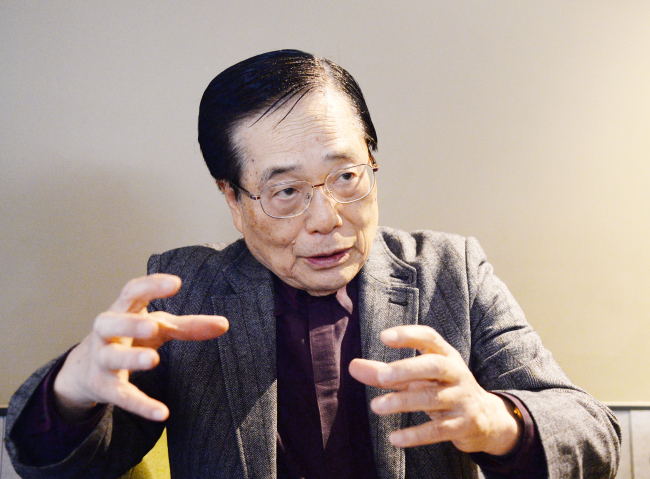‘Korea Herald holds unique value in promoting Korea to outside world’
By Yoon Min-sikPublished : May 3, 2018 - 18:31
Last week, the eye of the world was on the Korean Peninsula as the two Koreas’ leaders met at Panmunjeom to discuss peace on the peninsula.
“The inter-Korean summit is not just an issue between Koreas, but a trigger to change a paradigm that has continued since the Cold War. That’s the value that we hold in this era. We no longer have to underestimate our own value,” said Yun Ik-han, senior advisor of the Korea Journalists Club and former editor-in-chief of The Korea Herald, said in an interview with the newspaper.
Yun, 81, was at the forefront of when South Korea was building itself from the ashes of 1950-53 Korean War. Looking back on his three decades in journalism, Yun said that The Korea Herald holds a unique value as a window between the country and the outside world.
“The inter-Korean summit is not just an issue between Koreas, but a trigger to change a paradigm that has continued since the Cold War. That’s the value that we hold in this era. We no longer have to underestimate our own value,” said Yun Ik-han, senior advisor of the Korea Journalists Club and former editor-in-chief of The Korea Herald, said in an interview with the newspaper.
Yun, 81, was at the forefront of when South Korea was building itself from the ashes of 1950-53 Korean War. Looking back on his three decades in journalism, Yun said that The Korea Herald holds a unique value as a window between the country and the outside world.

“I believe each hand of The Korea Herald family writing the articles have played a part in overseas promotion of Korea. And we should still have such pride,” he said.
The Korea Herald was first published on Aug. 15, 1953 as the four-page tabloid The Korean Republic. But the similarity of its name with Republic of Korea sparked some confusion.
“Then-president (of the newspaper) visited some Southeast Asian country for a conference when the host introduced him as ‘the chief of The Korean Republic.’ Everyone treated him like the chief of our country,” said Yun, who joined the newspaper in 1964 after four years at Hankook Ilbo, a vernacular daily. “After that, the government intervened and we changed the name to The Korea Herald in 1965.”
Journalism was different then, especially English-language journalism in Korea. Yun, along with a Korea Times repotere were only reporters from English-language media outlets covering Cheong Wa Dae among the 11 reporters with access to the presidential office.
“There are a lot of English media now, but it was only us and the Korea Times back then so we were pretty much the way for the outside world to know about South Korea and the government,” he said. “One time I wrote that the foreign ministers of Korea and US were holding a meeting in Guam, and it was printed all over the world. Turns out they didn’t.”
“It was difficult for me to write stories, since foreign reporters would often cite me and get information on Korea from my stories. But I had tremendous pride. Even after I became editor-in-chief, I emphasized to the reporters that this (journalism) was their calling as a citizen of this country.”
Yun said this motivated him to push himself harder. During his time as the editor-in-chief, for three years starting in 1989, he held daily meetings with the head of the sales department, where he would listen to feedback from the expat community to reflect them in the paper.
This, he said, led to a rapid rise in subscription in the 1970s.
Selling newspapers in the 2010s, however, is becoming more of a challenge with more readers seeking digital options.
“Readers prefer the easy click and quick information, rather than to sit and ponder over the pages. Newspapers have to comply with their demands to some extent, thus the changes.
“But I still think that the bottom line is that print media hold unique values. In-depth stories and columns that put together a collection of knowledge to provoke deeper thoughts are still needed,” he said.
As the nation’s leading English newspaper, Yun said, The Korea Herald still holds a value that cannot be substituted in its role of letting the outside world know of the country's progress.
“Take for instance K-pop. It used to be that nobody recognized Korean music (outside of Korea), but it is everywhere now. We have to maximize our capabilities and potential as a nation,” he said. “As a newspaper, I think it is our duty not to get complacent in just writing about what happens now but to read the trend and contemplate on it.”
By Yoon Min-sik (minsikyoon@heraldcorp.com)








![[Graphic News] More Koreans say they plan long-distance trips this year](http://res.heraldm.com/phpwas/restmb_idxmake.php?idx=644&simg=/content/image/2024/04/17/20240417050828_0.gif&u=)
![[KH Explains] Hyundai's full hybrid edge to pay off amid slow transition to pure EVs](http://res.heraldm.com/phpwas/restmb_idxmake.php?idx=644&simg=/content/image/2024/04/18/20240418050645_0.jpg&u=20240419100350)






![[From the Scene] Monks, Buddhists hail return of remains of Buddhas](http://res.heraldm.com/phpwas/restmb_idxmake.php?idx=652&simg=/content/image/2024/04/19/20240419050617_0.jpg&u=20240419175937)

![[KH Explains] Hyundai's full hybrid edge to pay off amid slow transition to pure EVs](http://res.heraldm.com/phpwas/restmb_idxmake.php?idx=652&simg=/content/image/2024/04/18/20240418050645_0.jpg&u=20240419100350)

![[Today’s K-pop] Illit drops debut single remix](http://res.heraldm.com/phpwas/restmb_idxmake.php?idx=642&simg=/content/image/2024/04/19/20240419050612_0.jpg&u=)